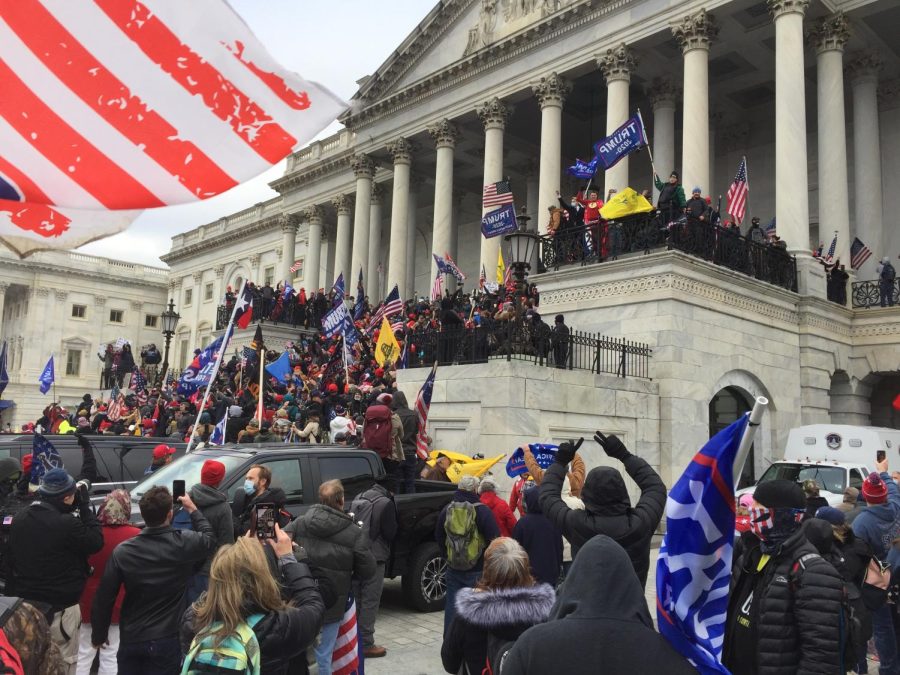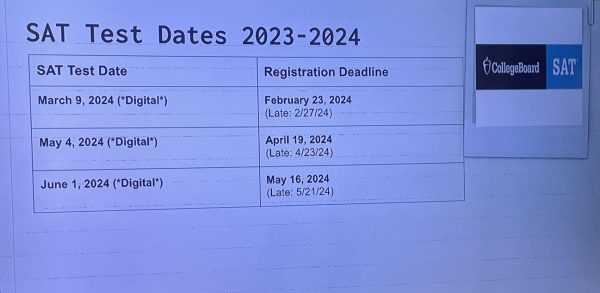Tensions, questions remain one year after Capitol riot
This image was accessed via Google Images under the Creative Commons License
Members of the crowd that ultimately broke into the Capitol building surge towards it in the early afternoon of January 6, 2021.
On January 6, 2021, people across the United States and around the world watched in shock as supporters of then-President Donald Trump broke into the Capitol Building with the intention of halting the confirmation of Joe Biden’s presidential win. A crowd stormed into one of the most secure buildings in the country and clashed with police in a series of deadly events that shook many in the U.S. to their foundational cores. Now, a year out from the insurrection and a year into the presidency of Joe Biden, the nation is still dealing with its consequences amid ever-present political tensions.
After election day in November of 2020, initial ballot results indicating current-President Joe Biden’s victory over then-President Trump were hotly contested across the U.S. by both Trump and his supporters. Claims of widespread voter fraud persisted through December and into 2021. On January 6, Congress was to count the electoral votes and officially declare the winner of the election in a custom that is historically mundane and undisputed. However, following a pro-Trump rally in which the President himself spoke, approximately 2,250 attendees of the rally launched an aggressive effort to break into the Capitol building and stop the vote counting.
The crowd successfully broke into the Capitol building and clashed with police for hours, resulting in the deaths of five individuals, including a Capitol police officer and a female protester who was shot and killed by the police.
Many Americans watched the situation unfold in real time on TV news stations and social media. Initial reactions varied from shock or fear to support of the protesters and their goal. People also sought to understand how political tensions could boil over in what first appeared as a spontaneous event.
However, “the events reflected the current climate socially and politically. They did not happen in a vacuum as a singular event. The George Floyd riots, COVID lockdowns and political scandals, to name a few, were contemporary events contributing to the hostile attitude at the time,” said Social Studies teacher, Mr. Lee.
Following the attack, the House of Representatives passed the National Commission to Investigate the January 6 Attack on the United States Capitol Complex Act, also known as the January 6 Commission, on May 19, 2021. The act allowed for a national investigation into the event, including those involved, as well as measures to improve security and prevent similar events from occurring again.
Since the act passed, more than 700 people have been arrested in connection to the events. At least 165 have pleaded guilty, 20 of them to felonies and the rest to misdemeanors. Some of the arrested have already been to trial and around 70 of them have been sentenced, roughly half of whom received prison time.
Approximately 140 U.S. prosecutors are involved in the proceedings as well as members from almost all of the 56 F.B.I. field offices.
There have been criticisms of the prosecution and investigation from both sides. A poll by the news agency Reuters approximated that about half of Republicans believe the protest was mostly non-violent or the work of Democratic extremists trying to discredit President Trump. Conversely, some Democrats and political leaders have claimed the event as one of domestic terrorism.
The difference in beliefs about basic aspects of the attack and the myriad of questions on American unity it presented reflects the often strained political and social climate across the country.
U.S. History teach Mr. Majoris commented that a recent NPR report suggested the disunity between Americans has spread from political extremists to disagreements between “regular” people that voice their opinions on controversial topics in very public places.
The ongoing coronavirus pandemic has likely only served to exacerbate this strain, and consequently, several surveys have estimated Americans believe the country is less unified than ever. While many Americans may find common ground in this sentiment, it remains largely unclear how to solve the problem peacefully and on the national scale.
“This event clearly demonstrated to me the importance we need to put back on History and Civics education. I strongly believe we need to do a better job of teaching what the ideals of our country and democracy are and how important these ideals are to assuring the success of our country,” offered Majoris.
The attack on the U.S. Capitol astonished many in America and around the world. Now, one year after the event, its effects still highlight the ever-present divides between Americans across the political landscape. While many believe the country is closer to disunity than ever before, some also believe in the hope of returning to a more United States of America, which may spur answers to the questions and tensions left unanswered by the January 6, 2021, Capitol insurrection.
Outside of school, you can usually find Emma dancing, solving word puzzles, buried deep inside a book, or dreaming of some new and delicious dessert to...











